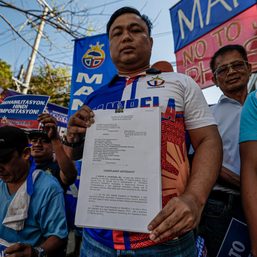SUMMARY
This is AI generated summarization, which may have errors. For context, always refer to the full article.
The Supreme Court cleared former president Gloria Macapagal Arroyo of graft and violation of the code of conduct in the botched $329-million National Broadband Network-ZTE deal (NBN-ZTE deal) scandal from 2007.
The Supreme Court 3rd Division said it could not re-litigate the case because the anti-graft court Sandiganbayan already acquitted her in 2016. To go into the merits again would be to violate Arroyo’s right against double jeopardy, the High Court said in a ruling promulgated October 2020, but released only recently.
“We cannot condone this specious approach at stretching the allowable limits of questioning a judgment of acquittal. Case law dictates that imputation of errors of judgment can never be allowed as an exception on the constitutional right against double jeopardy,” the decision said.
The Office of the Ombudsman under Conchita Carpio Morales fought it out at the Supreme Court, alleging that the Sandiganbayan made errors in its acquittal such as not giving weight to the transcript of a Senate hearing where a witness said an attempted bribe was made.
Generally, people acquitted cannot be retried since it violates their right against double jeopardy. But there are certain exceptions if a higher Court finds that the lower court committed grave abuse of discretion in acquitting a person.
The Supreme Court did this in 2019 when it revived graft charges against Senator Lito Lapid in the fertilizer fund scam case, even though the Sandiganbayan already cleared him based on inordinate delay – or a principle where the court junks charges because of a violation of the right to a speedy trial on account of the long time it took the Ombudsman to investigate.
The Supreme Court said, though, that this remedy should only attack a court’s error in jurisdiction, “not those which call for the evaluation of evidence and factual findings.”
The Supreme Court said what the Ombudsman under Morales did was to allege errors of judgment, and not errors of jurisdiction.
“Conformably then, we need not embark upon review of the factual and evidentiary issues raised by petitioner as these are obviously not within the realm of our jurisdiction,” said the Supreme Court.
Ombudsman Samuel Martires has adopted a policy where his office no longer appeals to the Supreme Court a Sandiganbayan decision to acquit an official.
What the case was about
The NBN-ZTE broadband deal was approved by the Philippine government through a unanimous vote by the National Economic and Development Authority (NEDA) board, which was then headed by Arroyo as president.
The approval came March 2007, not even a year after Chinese state-owned ZTE proposed the deal in August 2006.
Arroyo canceled the contract in 2007 due to some anomalies.
At a Senate hearing, former NEDA secretary Romulo Neri said that Arroyo’s election chairman at the time, Benjamin Abalos, tried to bribe him with P200 million to approve the deal. Neri said he reported this to Arroyo, according to Supreme Court records.
In the Ombudsman’s appeal, they bemoaned the Sandiganbayan’s treatment of Neri’s Senate testimony. The Sandiganbayan said that Neri’s testimony “was not propounded to the court,” even though the Ombudsman claimed transcripts of the Senate hearing were submitted to them.
The Sandiganbayan also said the deal enjoyed presumption of regularity. It gave weight, too, to a Department of Justice (DOJ) legal opinion that an executive agreement need not go through public bidding.
The Ombudsman said that the procurement law requires public bidding, no matter who the funder of the project is, whether it’s a local or foreign source. The Foreign Borrowings Act, the Ombudsman said, also requires a waiver if the foreign-funded project were to be exempted from bidding. The NBN-ZTE deal did not have a waiver, said the Ombudsman.
Arroyo was also charged for violation of the code of conduct because in November 2006, while the deal was being negotiated, she flew to Schenzhen, China where she and the former first gentleman Mike Arroyo played golf with Chinese officials and had lunch with ZTE officials.
The Sandiganbayan said it doesn’t have jurisdiction over that allegation since the act was done in China. The Sandiganbayan also said that the cost of golf and lunch were nominal.
The Ombudsman said the court could have recognized jurisdiction in that issue under the principle of continuing crimes.
All of these arguments were not discussed on merits by the Supreme Court, standing firm that a judgment of acquittal is final and unappealable.
It was also the Supreme Court that obliterated Ombudsman Morales’ cases against Arroyo and others in the P365-million PCSO intelligence fund scam. A 2016 novel ruling on plunder created a domino effect, so people involved in that scam have now all been cleared. – Rappler.com
Add a comment
How does this make you feel?









There are no comments yet. Add your comment to start the conversation.